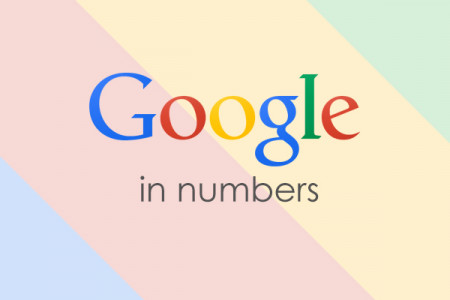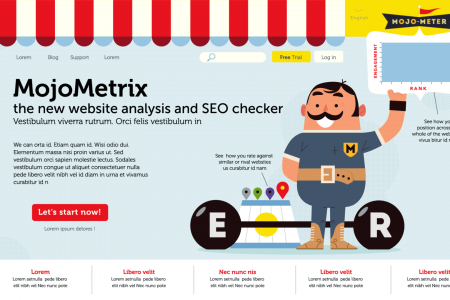
How Google's Algorithm Works
How Works Google! A Visual Guide to Google's Evolution Did you mean : How Does Google Find Answers? First Feeling lucky? In 1998 Google was miniscule! www.sadibi.com/howGoogleWorks The web was dominated by directories, portals like Yahoo!, Lycos, and AOL, & rivals like Hotbot. Google had to be different to survive. Google's algorithm tries to understand ? what you're asking. The difference? Google actually had answers. www.sadibi.com/howGoogleWorks Why? Better Algorithms. Remember, Google's only job is to keep us happy with better answers than its competitors. Next Google's algorithm matches your question with its data. Google owns the most valuable secret recipe in history. www.sadibi.com/howGoogleWorks But it's not magic. Search engines crawl the web taking as much information as possible and then use formulas and user data to answer our questions. The basics of search haven't changed much. But the intricacy of the process has. Read on to learn more. 1998: The Birth of Google In the beginning It was enough to figure out how well referenced a site was on a The Methods Google Uses to Arrange Its Data For an Answer What You Want To Know specific topic and match the keywords on that site with the words people used when they typed in their questions. Hilltop Algorithm, PR of relevant sites. (mostly dependent on links) Keyword usage in URL Keyword usage on page 2005: Google's Apex & Spam But knowledge is power and Google has tons of it. If you can game Google any other algorithm you can control the information people see and who they buy from. Thus why search engine optimization, or SEO, has been in an arms race with algorithms since 1997. In response to every The Methods Google Uses to Arrange Its Data For an Answer What You Want To Know Keyword Match To Query on site and in title tags Age of Site Anchor text of links Link popularity of site black bar an SEO could Exact match domain optimize for, and to keep users happy, Google's algorithm has to get more intricate. Personalized Search 2010: The Social Era The Methods Google Uses to Arrange Its Data For an Answer Most search engine have reached, or are close to reaching, a tipping point of being good enough, enough of the time. Some won't Authority of Site / Brand Link Popularity of Site Anchor text of links What You Want To Know remember the frustration of On page KW usage Traffic + CTR data using a search engine and not getting the answer you were looking for, but search engines inside of programs still offer us a glimpse into this reality. When you search in something like iTunes (which has arguably gotten worse over time), Pinterest, iTunes Store search, Twitter, Spotify, Facebook, etc. you're still using search tools based heavily on word matching, rather than contextualizing Social Graph Stats Ownership Of Site & Age User Personalization Anchor text of links Internal Linking Link popularity of site Exact match domain Personalized Search Keyword Usage on Site users' intent. 2015: The Mobile Era Bing, Wolfram, Duck Duck Go, and Google are the only search engines that are around this level of quality. The Methods Google Uses to Arrange Its Data For an Answer Topic Relevance of Site News & Trending Info Geographic Location Search History Click Through Rate What You Want Almost all searches meet their To Know intended answer. But pushing beyond this is still any body's game. ABC may have Android, Chrome, and YouTube pushing data into Google search but Apple's Siri, Pinterest Search, Time on Site Internal Linking Video Integration Bounce Rate and Facebook search have a Domain Authority level of personal contextual `Number of Backlinks information that could create `Backlink Freshness a tipping point in quality. Backlink Distribution Low Nofollow BL ratio Domain/Brand Mentions Domain to Page Ratio KW in anchor Text Google+ & Social Love ΗTTPS Site Speed Mobile 2030? Given machine learning What You Will Want which increasingly looks like To Know One can easily imagine physical factors like eye tracking, heart rate, & pupil dilation joining the myriad factors that go into how search engines return AI, VR, and the profusion of wearables It's likely that we're on the cusp of search engines anticipating our questions before we think of them. answers. But eventually search engines, or machine learning algorithms will interpret your physical environment, and physiological cues completely. At which point algorithms will supersede our querying intent. Giving us answers before we knew we needed them. Always play that one song when you're sad? Google's got you. Latest Star Wars movie tickets out for preorder? Done, and done. Undoubtedly this logic will extend throughout our physical environment, and between individuals. Sources: http://www.searchmetrics.com/knowledge-base/ranking-factors/ https://moz.com/blog/ranking-factors-version-3-released https://moz.com/blog/new-edition-ranking-factors-for-2011-live https://moz.com/blog/ranking-factors-version-2-released http://infolab.stanford.edu/~backrub/google.html https://www.searchenginejournal.com/pagerank-meet-hilltop/200/ I am not affiliated with any of the registered trademarks used in this graphic intentionally or unintentaionally, they belong solely to the companies described. This graphic is purely for educational Designed By Shaheen P. Adibi © 2016 | @s_adibi |www.sadibi.com purposes.
How Google's Algorithm Works
Source
http://www.s...ogleworks/Category
BusinessGet a Quote











